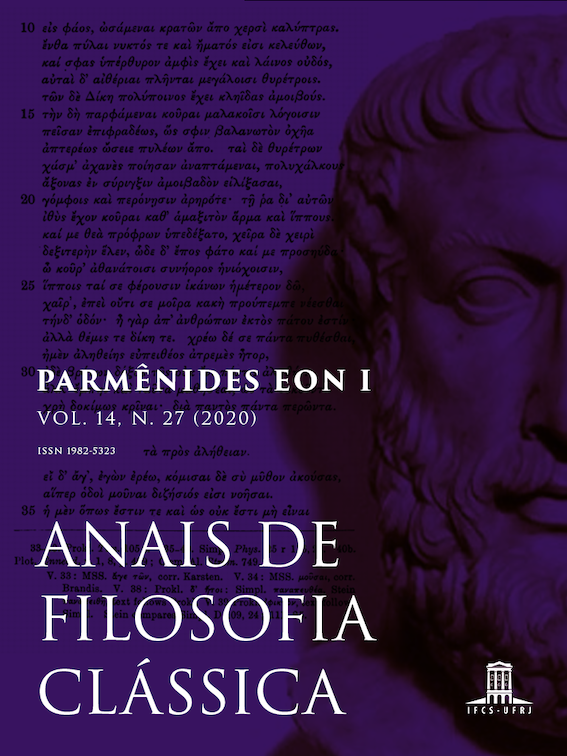The Eleatics and the Projects of Ontology
DOI:
https://doi.org/10.47661/afcl.v14i27.39982Parole chiave:
Parmenide, Zenone, Melisso, ontologia, inferenza, investigazione, linguaggio, non-essere, contradizioneAbstract
I frammenti di Parmenide offrono i più antichi esemplari di testi greci arrivati sino a noi con una riflessione tematica su to eon, essere oppure ciò-che-è, e su to mē eon, non essere oppure ciò-che-non-è. La sua opera ebbe un ruolo cruciale nella contestualizzazione di questioni e affermazioni ontologiche nei lavori che l’avrebbero seguito. Zenone e Melisso fanno di ciò-che-è o essere (to on o to eon) un punto centrale di discussione e si occupano direttamente dei ragionamenti e delle tematiche di Parmenide.
In filosofia, il termine ‘ontologia’ può significare lo studio della natura dell’essere o di ciò che l’essere è. Un altro importante uso di ‘ontologia’ fa riferimento a un insieme di affermazioni sulla natura e sul numero dell’essere o ciò-che-è, formando una specie di catalogo. Ma come possiamo caratterizzare meglio gli aspetti della produzione eleatica relativa all’ontologia? In quali modi e in quali contesti, se ci sono, si può dire che Parmenide, Zenone e Melisso studiano la natura dell’essere o di ciò-che-è? In che senso, se ce n’è uno, si può dire che Parmenide, Zenone e Melisso offrono un resoconto della natura e del numero dell’essere o di ciò-che-è? C’è qualcuno dei tre che adotta tale resoconto oppure essi se ne occupano in altro modo?
Sosterrò che negli Eleati si trovano tre impostazioni distinte, ma collegate, delle questioni ontologiche. Suggerirò che Parmenide e Zenone, e probabilmente Melisso, indagarono la possibilità di ricerca della natura e del numero dell’essere come un problema, mettendo in guardia contro l’adozione di una esposizione diretta e incondizionata della natura di ciò-che-è.
Downloads
Riferimenti bibliografici
Académie française. Dictionnaire de l’Académie française. 9th ed. Paris: Impr. nationale, Académie française, 1986. Online at https://academie.atilf.fr/9/ . Accessed June 24, 2020.
Barnes, Jonathan. The Presocratic Philosophers. Rev. ed. London : Routledge & Kegan Paul, 1982.
Bollack, Jean. Parménide: De l’étant au monde. Verdier poche. Lagrasse: Verdier, 2006.
Brémond, Mathilde. Lectures de Mélissos: Édition, Traduction et interprétation des témoignages sur Mélissos de Samos. Berlin: De Gruyter, Inc., 2017. http://ebookcentral.proquest.com/lib/gmu/detail.action?docID=5106143.
Cherubin, Rose. “Inquiry and What Is: Eleatics and Monisms.” Epoché 8, no. 1 (2003): 1–25.
—. “Why Matter? Aristotle, the Eleatics, and the Possibility of Explanation.” Graduate Faculty Philosophy Journal 26, no. 2 (2005): 1–29.
Clarke, Timothy. Aristotle and the Eleatic One. Oxford Aristotle Studies Series. Oxford, New York: Oxford University Press, 2019.
Cole, Thomas. “Archaic Truth.” Quaderni Urbinati di Cultura Classica, n.s. 13.1 (1983): 7–28.
Constantineau, Philippe. “La Question de la Vérité chez Parménide.” Phoenix 41.3 (1987): 217–40.
Cordero, Nestor-Luis. “Zénon d’Élée, Moniste ou Nihiliste?” La Parola del Passato 43 (1988): 100–126.
Denniston, J. D. The Greek Particles. 2d ed. Oxford: Clarendon Press, 1950.
Detienne, Marcel. Les maîtres de vérité dans la Grèce archaïque. Textes à l’appui, Histoire classique. Paris: Editions la Découverte, 1990.
Devaux, Michael, and Marco Lamanna. “The Rise and Early History of the Term Ontology (1606-1730).” Quaestio 9 (2009):
Galgano, Nicola Stefano. I precetti della dea: non essere e contraddizione in Parmenide di Elea. Storia della filosofia antica. Bologna: Diogene Multimedia, 2017.
—. “From Parmenides’ To Mē Eon To Melissus’ To Mēden.” Organon 2019, Volume 51 (2019): 5–22. https://doi.org/10.4467/00786500.ORG.19.001.11322.
Germani, Gloria. “ΑΛΗΘΕΙΗ in Parmenide.” La Parola del Passato 43 (1988): 177–206.
Graham, Daniel W. The Texts of Early Greek Philosophy: The Complete Fragments and Selected Testimonies of the Major Presocratics. Cambridge, UK; New York: Cambridge University Press, 2010.
—. Science before Socrates: Parmenides, Anaxagoras, and the New Astronomy. Oxford University Press, 2013.
Harriman, Benjamin. “The Beginning of Melissus’ On Nature or On What-Is: A Reconstruction.” The Journal of Hellenic Studies 135 (2015): 19–34.
Hermann, Arnold. To Think Like God: Pythagoras and Parmenides, the Origins of Philosophy. Las Vegas: Parmenides Publishing, 2004.
Imbs, Paul, and Bernard Quemada. Trésor de la langue française: Dictionnaire de la langue du XIXe et du XXe siècle (1789-1960). Paris: Editions du Centre national de la recherche scientifique, 1971-1994. Online at http://atilf.atilf.fr/tlfi.htm . Accessed June 23, 2020.
Kahn, Charles H. “The Greek Verb ‘To Be’ and the Concept of Being.” Foundations of Language 2, no. 3 (1966): 245–65.
—. “The Thesis of Parmenides.” The Review of Metaphysics 22, no. 4 (1969): 700–724.
—. The Verb “Be” in Ancient Greek: With a New Introductory Essay. Indianapolis, IN: Hackett Publishing, 2003.
Krischer, Tilman. “ΕΤΥΜΟΣ und ΑΛΗΘΗΣ.” Philologus 109 (1965): 161–74.
Lamanna, Marco. “La naissance de l’ontologie à Saint-Gall : Jacob Lorhard et la métaphysique monastique. Un état de la question.” Les Etudes philosophiques 203, no. 3 (2020): 17–36.
Mourelatos, Alexander P. D. “Parmenides, Early Greek Astronomy, and Modern Scientific Realism.” In Early Greek Philosophy, edited by Joe McCoy, 91–112. Washington, DC: Catholic University of America Press, 2013.
Palmer, John. Parmenides and Presocratic Philosophy. Oxford: Oxford University Press, 2009.
—. “Contradiction and Aporia in Early Greek Philosophy.” In The Aporetic Tradition in Ancient Philosophy, edited by George Karamanolis and Vasilis Politis, 9–28. Cambridge, UK: Cambridge University Press, 2017.
Pantelia, Maria, ed. Thesaurus Linguae Graecae® Digital Library. University of California, Irvine. http://www.tlg.uci.edu (accessed January 8, 2020).
Rézeau, Pierre; Bernard Quemada; Université de Besançon; Centre d’étude du vocabulaire français; Trésor général des langues et parlers français; Centre d’étude du français moderne; Institut national de la langue française. Base historique du vocabulaire français. Besançon: Centre d’étude du vocabulaire français, 1970. Online at http://atilf.atilf.fr/jykervei/ddl.htm . Accessed June 23, 2020.
Robbiano, Chiara. Becoming Being: On Parmenides’ Transformative Philosophy. International Pre-Platonic Studies 5. Sankt Augustin: Academia, 2006.
Rossetti, Livio. La filosofia non nasce con Talete: e nemmeno con Socrate. Bologna: Diogene 2015.
—. “Pseudophaēs e Pseudophanēs. La Luna secondo Parmenide.” In Apis Matina: Studi in Onore Di Carlo Santini, edited by A. Setaioli, 613–24. Trieste: EUT Edizioni Università di Trieste, 2016.
—. Un altro Parmenide. Volumen II, Luna, antipodi, sessualità, logica. Storia della Filosofia antica. Bologna: Diogene, 2017.
—. Lezioni eleatiche (forthcoming).
Sedley, David. “Zenonian Strategies.” In Oxford Studies in Ancient Philosophy, 53 (2017): 1–32.
Smyth, Herbert Weir. Greek Grammar. Rev. ed. Cambridge, MA: Harvard University Press, 1956.


